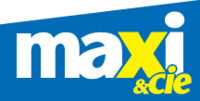Maxi (Canadian supermarket)
_Logo.png) | |
| Division | |
| Industry | Supermarket (Maxi) / Hypermarket (Maxi & Cie) |
| Founded | 1984 |
| Products |
Bakery, beer, dairy, deli, frozen foods, gasoline*, general grocery, general merchandise*, liquor*, meat & poultry, pharmacy, produce, seafood, snacks, wine * Select locations |
Number of employees | 7,000[1] |
| Parent | Loblaw Companies |
| Website | http://www.maxi.ca/ |
Maxi is a discount grocery retailer based in Quebec, Canada. It is a subsidiary of Loblaw Companies[2] and the largest of Loblaws' Quebec supermarket chains. Maxi is the Quebec equivalent of No Frills, a chain of franchised discount grocery stores outside Quebec, except that Maxi stores are company owned. Over 7,000 people are employed at the Maxi and Maxi & Cie stores across Quebec.
History

Founded in 1984 by Provigo, the first two Maxi grocery stores opened in St. Leonard and Longueuil. Both locations had taken vacated spaces that were previously occupied by Kmart stores and both locations are still in operation today (though they have both expanded throughout the years to the point that the Longueuil outlet is now a Maxi & Cie hypermarket).
Throughout the 1980s and early 90s, Maxi used a cartoonish elephant as the mascot of its flyers, in a move similar to that of its sister chain Héritage which used a kangaroo. In 1996, Maxi enjoyed so much success that the chain stopped producing flyers as the company felt such practice had become unnecessary. This turned out to be a miscalculation and Maxi eventually started making flyers again.
A lot of Maxi stores today were those that were Steinberg supermarkets until that chain went bankrupt in 1992. In 1993, several Provigo stores (especially the larger ones) were rebranded as Maxi stores. Maxi even absorbed Provigo's older brand Héritage in 1995. Maxi briefly used to have stores in Ontario, but they were converted to No Frills in 1999 after Loblaws purchased Provigo.[1] There are 96 Maxi stores and 16 Maxi & Cie in the province of Quebec.
Maxi & Cie
The chain's Maxi & Cie / Maxi & Co. locations are larger and carry a wider variety of general merchandise, more akin to the hypermarket model. Some Maxi & Cie stores are themselves former Maxi stores that were converted because of their larger size. The original Maxi & Cie stores opened in 1996 on Jean-Talon street in Saint-Leonard, Quebec and Cousineau boulevard in Saint-Hubert, Quebec; both are still in operation.
Like with Maxi, Maxi & Co. used to have stores in Ontario, but Maxi & Co. withdrew from Ontario after the Loblaws purchase of the chain. The 1998 movie Pushing Tin had a scene at one of the Maxi & Co. stores in Ontario.
During 2009, a few Loblaws stores in Quebec were converted to Maxi & Cie, particularly in Montréal-Nord & Laval.
See also
References
- 1 2 "Maxi – Who We Are". Retrieved 28 July 2013.
- ↑ "About Us". Loblaw Companies. Retrieved 2016-09-16.